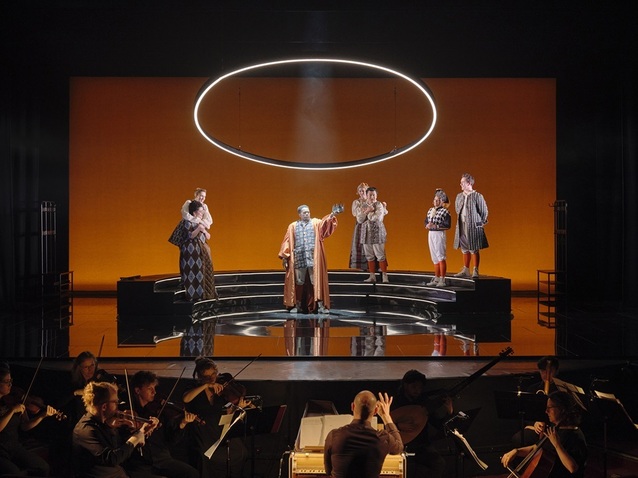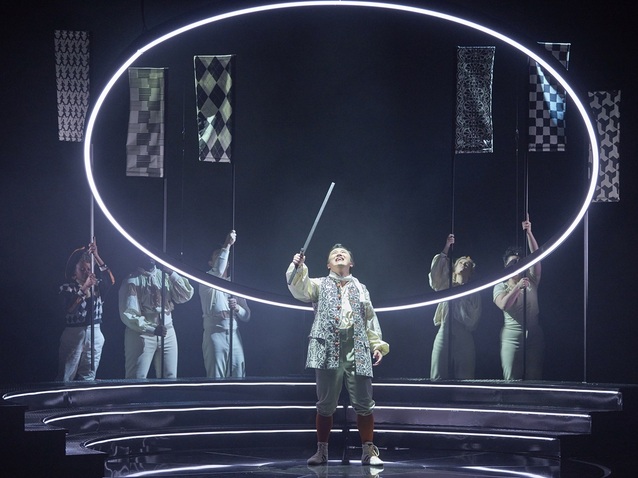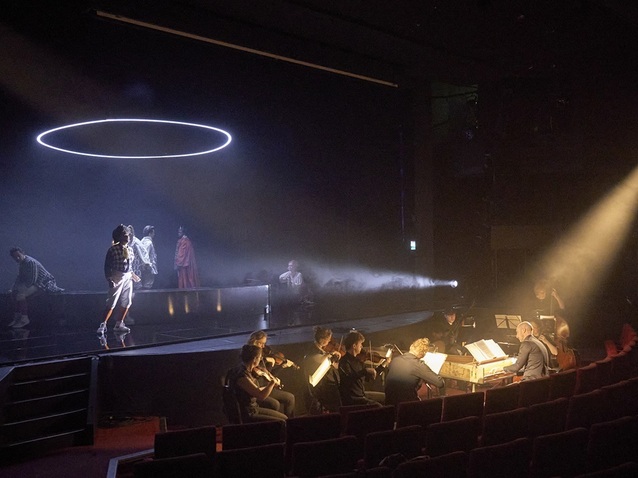 © INO L'Olimpiade - Photo Ros Kavanagh
© INO L'Olimpiade - Photo Ros Kavanagh
Antonio Vivaldi’s L'Olimpiade uses an Italian libretto by Pietro Metastasio that was originally written for Antonio Caldara’s eponymous 1733 opera. Vivaldi’s own version premiered at Venice’s Teatro Sant’Angelo on 17 February 1734, while the libretto would go on to be set to music by over fifty composers including Giovanni Battista Pergolesi in 1735.
The action takes place in ancient times in Sicyon during an Olympic Games. Megacle plans to enter under the name of his friend Licida, who is believed to be the son of the King of Crete. Megacle feels bound to help Licida because he once saved his life, but is nonetheless distressed to learn that the prize for winning the Games is the hand of Aristea, daughter of the King of Sicyon, Clistene. This is because Megacle and Aristea are in love, so if Megacle were to be triumphant he would be winning her for Licida rather than himself. At the same time, Argene, a Princess from Crete, has arrived in Sicyon disguised as a shepherdess in an attempt to pursue Licida who was once betrothed to her.
Megacle wins the Games, and both he and Aristea are heart broken at the thought of her marrying Licida rather than him. Megacle departs and apparently drowns himself, while Clistene, apprised of the deception at the Games, banishes Licida. Megacle is, however, rescued alive by a fisherman, and Licida contemplates assassinating the King. When he is caught he faces death, but Argene offers herself in his place and proves she is a Princess by revealing a chain that was given to her by Licida. Clistene recognises it as belonging to his son, who was abandoned in infancy to forestall the prophecy that he would kill his parent. After father and son are reconciled, Licida accepts Argene, leaving the way clear for his sister Aristea to marry Megacle.

Meili Li (Licida) INO L'Olimpiade - photo Ros Kavanagh
This staging represents a co-production between the Royal Opera, Irish National Opera and Nouvel Opéra Fribourg. In fact, a visit by INO to the Royal Opera House’s intimate Linbury Theatre is fast becoming an annual event with Vivaldi’s Bajazet appearing in 2022 and Brian Irvine’s Least Like The Other, Searching for Rosemary Kennedy arriving last year. On this occasion, the work is directed by Daisy Evans who succeeds in creating a coherent and effective production from what might be seen as an unwieldy story. As the action is set in ancient Greece, designer Molly O’Cathain sees the stage comprise a Greek amphitheatre, which provides an appropriate setting for the Games while also alluding to the very notion of drama. At the same time, as the music and interpretation of events are Baroque, the figures are dressed in 1730s costumes with the male characters wearing blacks, whites and reds and the women carrying the colours of Greek earthenware. Alluding to the idea of athletes donning their uniforms, each performer wears basic clothes before ‘stepping into’ their character by putting on, for example, a jacket with an ‘L’ on it when Megacle is competing as Licida.
Although drawing explicit attention to the fact that the singers are assuming roles could prevent us from genuinely believing in the characters we see, overall the decision works well. The fluidity that results from the performers being able to don and discard their costumes enables those who are not centre-stage in a scene to act like a Greek Chorus by surrounding, enhancing and reacting to the main action. The decision aids clarity because when certain characters are referred to, the relevant person can stand at the side of the stage. It also enhances the subtexts so that when the wonderful prize that awaits the winner of the Games is first mentioned, Aristea comes forward to reveal to us that she is it. In a story in which Megacle is believed to be dead, removing his jacket from his body is a powerful way of revealing how he no longer exists.

Rachel Redmond (Aminta) with Irish Baroque Orchestra, conductor Peter Whelan - INO L'Olimpiade - Photo Ros Kavanagh
L’Olimpiade may refer specifically to the Olympics, but it could also represent the Greek term Olympiad, which denotes a period of four years that was marked by an opening festival of the Olympic Games. Evans believes that the opera’s themes of rebirth and reconnection tie in with this cyclical notion, and her staging certainly makes us feels as if we are passing through warm and cold seasons, both physically and metaphorically. On occasions sunflowers are carried by the ‘Greek Chorus’ and planted in the set, but when Argene sings of her plight those that she holds are taken from her as if to reveal the stark reality of her situation. Through intelligent lighting alterations, courtesy of Jake Wiltshire, we genuinely feel the emotional warmth of day and the coldness of night. A luminous ring hanging above the stage acts as a strong framing device, and almost as a halo when performers stand beneath it and produce an ethereal sound. The low amphitheatre structure is sometimes rotated by the cast in a Brechtian manner, with the way in which its different sections can be separated or joined together reflecting the divisions and reconciliations that occur in the plot.
The Irish Baroque Orchestra, conducted from the harpsichord by Peter Whelan, produces an extremely accomplished sound while, from among the strong cast, several performances stand out. As Licida, Meili Li combines a spirited performance with an almost spiritual countertenor, as his ethereal sound is matched by the level of consistency he achieves across the evening. On opening night Gemma Ní Bhriain was unwell and so walked the part of Megacle while Maria Schellenberg sang it from the pit, and in the process revealed a notably full and sumptuous mezzo-soprano.
As Aristea, Alexandra Urquiola’s own mezzo-soprano is highly intriguing as it is possessed of some quite distinctive shades, while Sarah Richmond is a persuasive and effective Argene. Chuma Sijeqa asserts his strong and secure bass-baritone to tremendous effect as Clistene, and Seán Boylan reveals a warm and engaging baritone as his friend Alcandro. Finally, soprano Rachel Redmond is simply a class act as Licida’s tutor Aminta, and the numerous runs she delivers just before the interval put the seal on what is an impressive performance all round.
By Sam Smith
L’Olimpiade | 13 - 25 May 2024 | Linbury Theatre, Royal Opera House, Covent Garden
the 15 of May, 2024 | Print
Comments